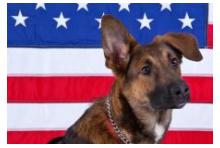The philosophy, standards and the training methods we use at Paws For Life USA are all focused on the care and health of our dogs, the patience and respect for our handlers, their families and our staff together with providing positive and reward / praise-based training for all the dogs in our PFL program. Everyone is different and we focus on the types of jobs that our dogs will perform and the required types of training that will
be needed. A Service dog is not trained to do the ... Read More
The philosophy, standards and the training methods we use at Paws For Life USA are all focused on the care and health of our dogs, the patience and respect for our handlers, their families and our staff together with providing positive and reward / praise-based training for all the dogs in our PFL program. Everyone is different and we focus on the types of jobs that our dogs will perform and the required types of training that will
be needed. A Service dog is not trained to do the same job nor are they trained in the same manner and method as that of a Therapy dog. All dog breeds have different characteristics and temperaments, all our handlers are different in their needs or requirements, this is why for us, it is so very important to make the right match
between dog and handler – this is where the magic is made. For our program it has to be love at first sight for both.
We primarily use Poodle mixes, Labradors, Golden Retrievers, Poodles, German Shepherds and on occasion other breed types or mixed breeds that may benefit a specific client’s needs in a Service Dog. We use these breed types mainly because of their ability, willingness to work, loyalty, stamina, and their intelligence. We have found the blood lines we use and have followed over the last 15 + years to provide the genetic gene pool of
consistently having puppies that for us have provided the service and therapy dogs we love. Just like children in a family, pups from a litter are individually different but have similar genetic traits so selection for an individual is important for the tasks we will be training that puppy to learn. Not all pups from a litter we evaluate will
become service dogs, we may be able to select one. Some are too high drive, some no drive, some are too independent and some to clingy, but without some drive and some independence a dog will not be the right fit that what we are looking for. So, it is a fine line of balance that gives a dog the ability to learn and confidently function as a service dog. Most dogs are happy when working and having a busy purpose even if they are just getting the mail from the mail-box or putting their toys away.
Our philosophy is to train by motivation. That motivation can be a reward or a correction. Reward can be a pat on the dog’s head or a friendly scratch behind the ear, or a word of
praise, occasionally food maybe used but we try not to use any food as a motivator. We want our dogs to exhibit the desired behavior because they want to please us not because they have been offered an edible treat.
We train all of our dogs in basic obedience as this is the foundation to learning and good behavior. We build our training around communication and body language and once a dog starts to learn what is expected of them, they really enjoy working with us. We train in baby steps and build one command upon the another. We do not over train and always end with a successful task that we know the dog can perform before ending that training session. It is better to train in short segments during the day rather than trying to learn to much too fast. The dog will be more willing to work and less frustrated. Dog training is a process and the secret is consistency and patience. Don't try to learn to much too fast as it will frustrate or confuse the dog. If you just watch your dog during training, not over talking to the dog, you will see when the dogs brain kicks in and they understand what you want. Keep it simple and try to have your command words sound different from each
other. We try to always end each training session on a positive note because next time the dog will be more willing to learn and want to please you.
We require our service dogs to respond to basic obedience and skilled tasks for their handler at least 90% to 95% of the time on the first ask in all situations and with all types of distractions. Our dogs are trained in voice and hand signals for basic, place, sit, down, stand, stay, front, back, ground, crawl, close, brace, come, leave it,
fetch, find and free. Our dogs must be able to demonstrate that they can exhibit the same good behavior in and out of the home. All our dogs are initially trained to a minimum of 3 tasks to mitigate their handler’s disability.
We train handler and dog together in all realms of their task training, care and laws both Federal and State as regards to their service dog. Any dog that we place we are available 24/7 for questions and assistance and we are with our dogs for life. Paws For Life USA provides all the initial equipment, appropriate vests, laminated ID card a mobile ID and we
also ensure that all dogs in our program are either spayed or neutered, microchipped, current on all vaccinations and maintained on monthly heartworm, flea and tick prevention. Our veterinarians provide wellness checks on all the puppies/dogs coming into the program ensuring that the puppies do not have any underlying medical
conditions. We work with our clients for travel in and out of state / overseas to make sure all compliances are met for both their dog and themselves. We train all our volunteers and handlers in the humane care and treatment for their and any dogs that they may come into contact with in the program. We require a minimum of 150 hours of obedience and task training. Since most of our clients also act as puppy raisers for their own matched dog, the actual time they may spend together goes into the thousands for a service
dog in training, including the socialization and habituation. Most are able to graduate between 2 to 2.5 years with a team, followed by additional tasks, obedience refresher courses and changes in disabilities for the life of the dog. All dogs will achieve their Canine Good Citizen including Urban and Community Citizen. Our dogs will also achieve beginner, intermediate and advanced obedience class certifications, graduating with their Public Access Test.
We want our dogs to be able to problem solve and think on their feet and to be able to handle situations that they may be presented with at any given time or location. This is particularly crucial when their handler may not be in a position to offer any form of guidance.
The Partnerships We Create Are Life Changing Our programs demonstrate fair and equal policies and procedures for employees, trainers, volunteers and handlers along with their families or care givers and will include all staff with specific job descriptions and contacts. We insure all our volunteers and staff have in depth training based on our high standards of required policy. We all sign confidentiality agreements including our Board of Directors, and we have a complaint / compliance process in place for handlers, volunteers, trainers and staff. Our program provides certification of owner trained teams and they are required to meet all our standards for, evaluation, training and certification. We provide follow up team support to all our handlers and their dogs for the life of their dog. We train veterans, military, first responders, police and those with unseen disabilities and those who qualify under the ADA / Federal and who are in need of a service dog. As with all our clients with seen and unseen disabilities we effectively train and work with our volunteers, trainers and staff to ensure that every handler that we bring into the program or who is considering coming into the program is treated with the utmost respect and dignity. We are here to provide a quality of life and build lasting relationships with those in need of a trained service dog to help them obtain that independence. Our motto is The Partnerships We Create Are Life Changing and we get there with Practice, Patience and Persistence.
Hide Full Text


